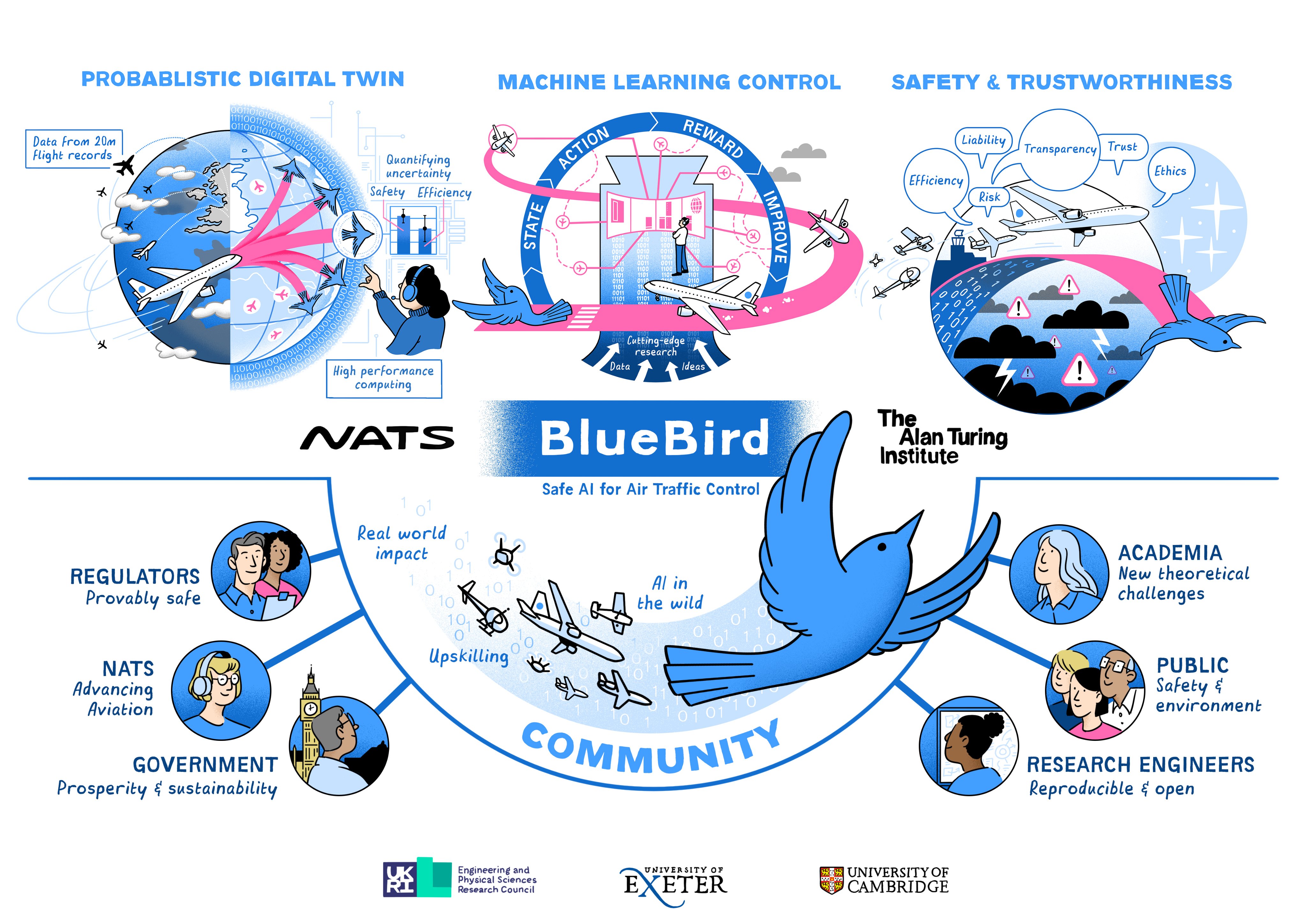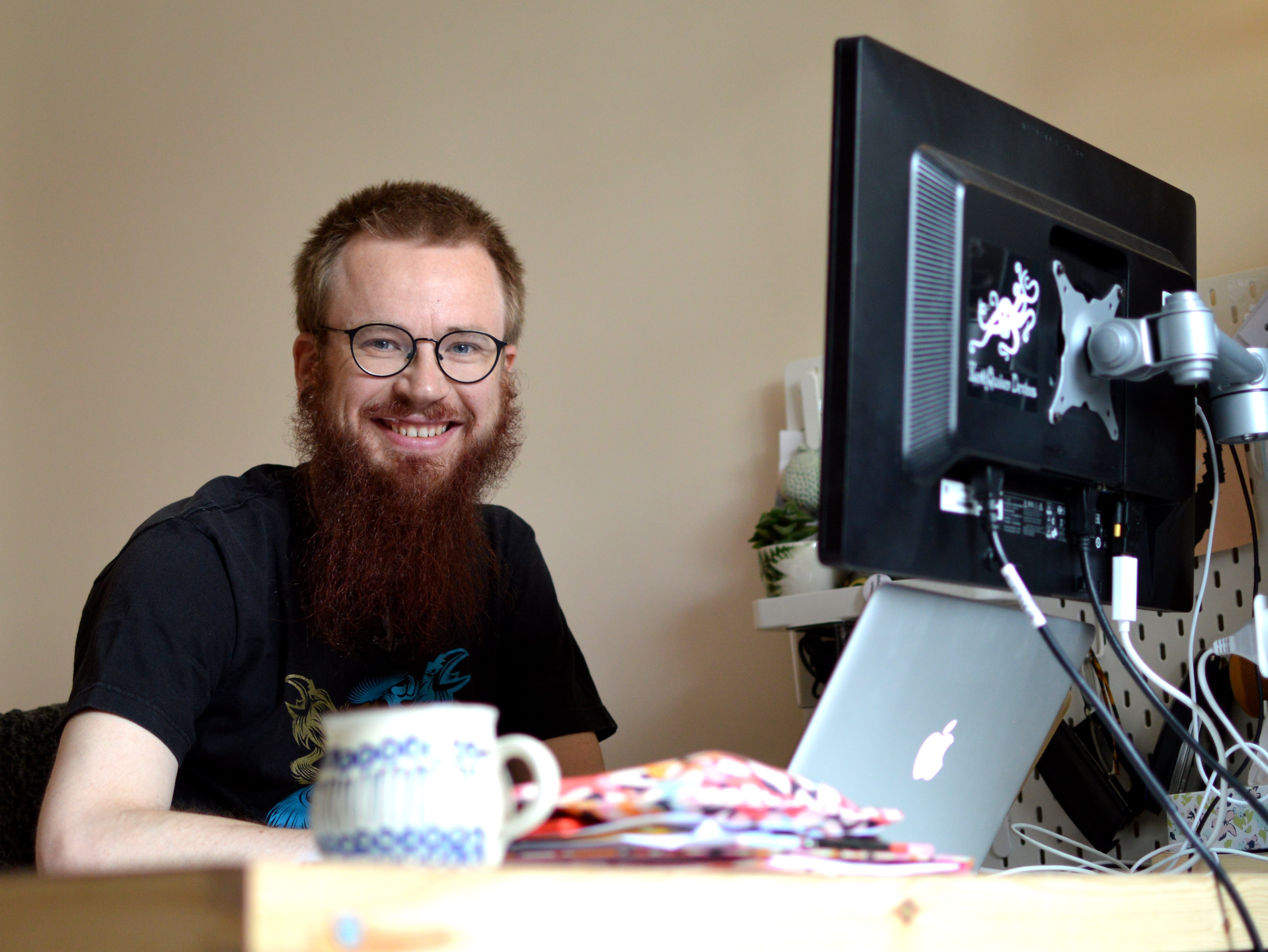BLOG
The DCE group at University of Exeter does leading research at the dynamic interface between applied mathematics, statistics and high-performance computing. Spanning all aspects of research from fundamental theory in data science and AI to applied industrial focused projects, the group works with major international companies, research centres and university partners.

1658429329000
IDSAI Data Science Week 2022
Following on from their successful Day of Ideas, IDSAI recently held its Data Science Week 2022 – a series of presentations and networking events which saw colleagues from Exeter and other leading universities come together to share their work. Topics ranged from the role of climate and weather in supporting resilience decision-making (Professor Chris Dent from the University of Edinburgh), to a fascinating presentation on VespAlert, Penryn’s Applied Ecology in the Environment and Sustainability Institute (ESI) project designed to develop an automated optical detection system, with the aim of preventing the establishment of Asian hornets in the UK. DCE lead Professor Tim Dodwell gave a lively and thought-provoking presentation on bridging the gap between the academic and commercial worlds, sharing a wealth of experience gained from establishing spin-off company digiLab. An innovation company delivering next-generation data science, digiLab aims to create competitive advantage for businesses by enabling them to exploit the value locked in their models and data, through the creation of customisable Digital Twin solutions. Along with Dan Hatfield, a digiLab Director with 25 years international experience in the technology sector, Tim invited the audience to look beyond the purely academic and consider how high-level research conducted by colleagues in both IDSAI and the DCE group can be applied to real-world situations, to the benefit of all. Interesting, varied and lively sessions and an opportunity to chat to colleagues and share research intelligence, all fortified by some excellent refreshment – a truly stimulating week that was enjoyed by all.

1653998693000
IDSAI - Day of ideas
We were delighted to represent the DCE centre at the Institute for Data Science and Artificial Intelligence (IDSAI) Day of Ideas at Exeter Castle on 17th May, where we got the opportunity to showcase some of the work we are doing with our academic and industry partners. It was great to jettison Zoom for a change and see so many colleagues in person, catching up with old friends and exchanging thoughts and ideas on all things Data Science. Particularly valuable was the opportunity to hear from some leading figures in the field including Professor Sir Adrian Smith PRS, Director and Chief Executive of the Alan Turing Institute and Professor Richard Everson, Director of IDSAI. Professor Lisa Roberts - Vice-Chancellor and Chief Executive of the University of Exeter - provided a valuable introduction to proceedings, setting the scene for what was a really successful event, brilliantly encapsulated in Scriberia’s illustration above. Wine, cream teas and inspirational discussion with like-minded colleagues – what more could you ask of a day out?

1625501539000
DCE group secures major funding boosts from EPSRC to shape the future of UK aviation sector
A new project proposed by the University of Exeter, University of Cambridge, Alan Turing Institute and NATS has successfully received multi-million funding support to develop the world’s first AI air control system. This new ground-breaking project is called BlueBird and is funded by the EPSRC Prosperity Partnership programme for 5 years, with a vision of shaping the future of sustainable aviation by developing the fundamental science and technical approaches to deliver and deploy AI systems for UK airspace. DCE group from the University of Exeter will play a crucial role in supporting this interdisciplinary project in the next 5 years, bringing together leading researchers in data science and AI areas to respond effectively to the unprecedented challenges arising from the pandemic, Brexit and global warming. The DCE group lead, Professor Tim Dodwell who is also the principal investigator of this massive grant elaborated on the necessities and benefits of the establishment of the new partnership with NATS, Cambridge and Turing. “The new partnership is designed to exploit new approaches to AI that enable increases in safety, capacity and environmental sustainability while streamlining air traffic controller training. This partnership will put the UK at the vanguard of technical advances in the sector, to modernise the design and control of UK airspace and positioning the UK as a global leader in sustainable aviation.” The project which started in July 2021 is offering great job opportunities to early career researchers to be based at Exeter and Turing across three themes: (1) Digital Twin of UK Airspace (2) Multi-Agent Machine Learning Control of Air Traffic (3) Safe and Trustworthy Air Traffic Control. There are three postdoc positions available immediately from the DCE group to work with Professor Tim Dodwell, Professor Richard Everson and Dr Edmond Awad at the University of Exeter on each of these themes. For more details about the job description and how to apply, please click the links below: PDRA 1 - Exeter / Turing Research Fellow in Probabilistic Machine Learning PDRA 2 - Exeter / Turing Research Fellow in Machine Learning Control PDRA 3 - Exeter / Turing Research Fellow in Human-Computer Interaction

1621002172000
Data Centric Research from a Home Office
Author: Mikkel Bue Lykkegaard It has been an interesting year, to put it mildly. When the first lockdown struck, I was officially 6 months into my PhD, but had been working on it for a while longer. Since my work is mostly taking place on a computer, it did not affect me as much as some of my peers. I dug into my numerical experiments from my bedroom-come-home-office, and video meetings became the modus operandi of sharing ideas, challenges, and general workplace banter. It has now been over a year since the first lockdown, and a highly productive one, in spite of the disruption. We had our Multilevel Delayed Acceptance (MLDA) sampler accepted into the upstream PyMC3 code and contributed a tutorial to the PyMCon 2020 conference. We also participated in the Machine Learning for Engineering Modeling, Simulation, and Design workshop at NeurIPS 2020 with a conference paper on the same topic. On the more applied side of things, I had my first paper published in Computer Methods in Applied Mechanics and Engineering (CMAME) after a fairly long review process. It was not that there were that many suggested changes, but I think the reviewers, like everyone else, had unexpected challenges to deal with, aside from reviewing my research. In the paper, we develop a Metropolis-Hastings algorithm that exploits a Deep Neural Network proxy to accelerate uncertainty quantification of groundwater flow. The reviewers had mostly nice things to say about it, so I am really happy to have made my first, but hopefully not last, contribution to science. I will be presenting this research at the Digital World Water Conference, which was originally meant to be a traditional physical conference but was moved online for obvious reasons. Anyway, the PhD is not a time to rest on my laurels (at least not for too long), so onwards an upwards. Our next project is about developing a methodology for adaptive optimal design of groundwater surveys. For the uninitiated, this translates roughly into “Where to Drill Next?”, which is one of the original motivations for my PhD. It (unsurprisingly) turns out that the answer to that question is less than obvious. Looking for an optimal place to take a groundwater sample begs the question "optimal with respect to what?", which is completely problem-dependent, and the numerics are non-trivial. While not universally applicable, we have developed a methodology that exploits the adjoint of our stochastic groundwater model to explore uncertain model sensitivities throughout our groundwater modeling domain. The details are fairly technical and there are still some unanswered questions, but I am running the experiments as I write this, and a publication will follow as soon as we have worked out the details. All things considered, it has been a pretty good year. Our research group has been supportive all the way through, and while certain aspects of academic life have been reduced (such as going to actual, physical conferences and the obligatory pint-after-work), unexpected opportunities have presented themselves from the vacuum. I think - hope - that looking back on this unusual time, we can perceive it, not as a period of restriction, but as one of discovery.

1600355408000
Postponed: Data Study Group in Offshore Wind Industry November 2020
To adhere to the latest UK government rules to reduce the Covid-19 transmission rate, we have to make this tough decision to postpone this face-to-face event to next year. Meanwhile, the application is open for a longer period of time. We will keep you posted once the new proposed dates are finalised and we very much look forward to seeing you in the event when we are able to meet in person. With support from the Alan Turing Institute, we are organising a data study group to develop new methods for predictive maintenance of offshore wind farms. Over 3 days, study group participants from across a variety of disciplines will work in teams to interrogate a large data set available from a UK-based wind farm and develop novel data science solutions to challenges for predictive maintenance. The ultimate aim is to use the latest methods in AI and Data Science to make this important renewable energy source more cost-efficient for our sustainable future. The study group, led by Professor Tim Dodwell, will take place over 3-days in November 2020 on Streatham campus. Study group members will be carefully selected to ensure a complementary interdisciplinary mix of skills in data sciences, renewable energy and engineering. This is a particularly good opportunity for early career researchers looking to build new interdisciplinary collaborations, learn new skills, or apply their knowledge and expertise in a new application area. Please note that travel bursaries will be available to support participants who need to travel to Exeter to attend the event. If you would like to take part, please apply here. Due to many uncertainties in the future, the event would be postponed to next year if we were forced to enter into a second lockdown. If you have any questions please contact Research Manager of Data Centric Engineering Group, Ms Yujin Du y.du@exeter.ac.uk